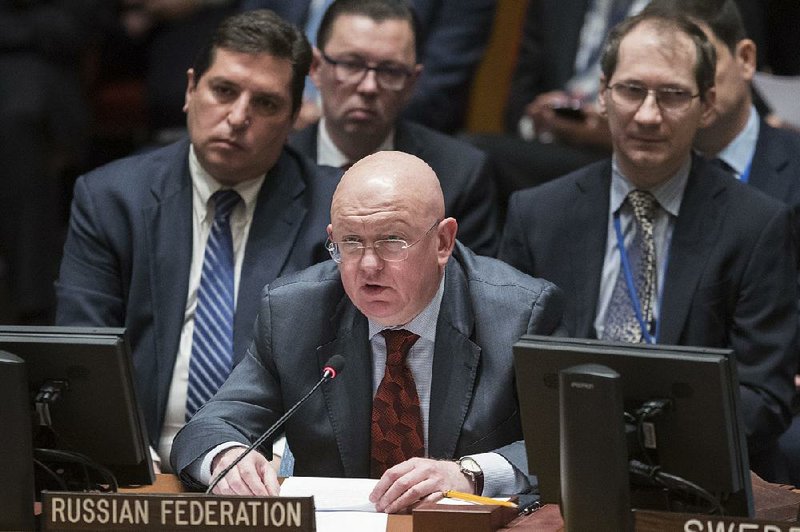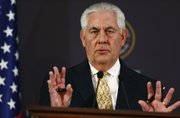The U.S.' executive branch has decided that it needs no new legal authority from Congress to indefinitely keep military forces deployed in Syria and Iraq, even in territory that has been cleared of Islamic State fighters, Pentagon and State Department officials said.
In a pair of letters, the officials illuminated the presidential administration's planning for an open-ended mission of forces in Syria beyond the Islamic State fight. Secretary of State Rex Tillerson foreshadowed the plan in a speech last month, saying troops will stay in Syria to curb Iran and prevent the Syrian government from reconquering rebel-held areas.
Though Tillerson also cited a need to mop up the remnants of the Islamic State extremist group and keep from leaving a vacuum in which the group could regenerate, other administration officials put far greater emphasis on the extremists. In the letters, they said the continued potential threat from the Islamic State provided a legal rationale for President Donald Trump's administration to keep U.S. troops deployed there indefinitely.
"Just as when we previously removed U.S. forces prematurely, the group will look to exploit any abatement in pressure to regenerate capabilities and reestablish local control of territory," wrote David Trachtenberg, the deputy undersecretary of defense for policy.
[THE ISLAMIC STATE: Timeline of group’s rise, fall; details on campaign to fight it]
About 2,000 U.S. troops are in Syria, where nearly all the territory once held by the Islamic State has now been liberated. Tillerson deemed the group "substantially, but not completely, defeated," warning that the insurgents remained a threat.
Trachtenberg wrote the letter to Sen. Tim Kaine, D-Va., who had asked the Trump administration to explain its understanding of its authority to stay on in Syria. The State Department sent him a similar letter, which also argued that international law provided a basis for U.S. forces to remain in Syria -- despite the lack of consent from the Syrian government -- to protect Iraq and the United States from terrorists.
And both letters said U.S. troops may strike at Syrian government or Iranian forces deemed to threaten Americans or Syrian rebel groups that are assisting the United States in fighting the Islamic State, also known as ISIS.
"The United States does not seek to fight the government of Syria or Iran or Iranian-supported groups in Iraq or Syria," wrote Mary Waters, the assistant secretary of state for legislative affairs. "However, the United States will not hesitate to use necessary and proportionate force to defend U.S., coalition or partner forces engaged in operations to defeat ISIS and degrade al-Qaida."
U.S. troops carried out strikes against forces loyal to President Bashar Assad of Syria several times in 2017 in the name of defending U.S.-supported rebel groups.
In a statement, Kaine said the executive branch was stretching its interpretation of its war authority too far. He called on the Trump administration to seek new authorization for any continued, long-term mission in Syria and Iraq.
WAR AND THE OLIGARCH
The Washington Post meanwhile reported, citing U.S. intelligence reports, that a Russian oligarch believed to control the Russian mercenaries who attacked U.S. troops and their allies in Syria earlier this month was in close touch with Kremlin and Syrian officials in the weeks before and after the attack.
In intercepted communications in late January, the oligarch, Yevgeniy Prigozhin, told a senior Syrian official that he had "secured permission" from an unspecified Russian minister to move forward with a "fast and strong" initiative that would take place in early February.
Prigozhin made headlines last week when he was indicted by special counsel Robert Mueller on charges of bankrolling and guiding a long-running Russian scheme to conduct "information warfare" during the 2016 U.S. presidential campaign. He is known to have close ties to Russian President Vladimir Putin.
Among his various enterprises, U.S. intelligence believes that Prigozhin also "almost certainly" controls Russian mercenaries fighting in Syria on behalf of Assad. The mercenaries, employed by a company called Wagner, comprise ultranationalist Russians and military veterans, some of whom also fought in the Ukraine conflict, according to Russian news reports.
The U.S. intelligence reports provide additional information about an incident that remains murky, with the Pentagon providing few details and the Russians offering changing accounts.
U.S. intelligence agencies declined to comment on the reports.
The attack took place on the night of Feb. 7-8, when pro-Syrian government forces attacked positions of the U.S.-backed Syrian Kurdish fighters in Syria's oil-rich eastern province of Deir el-Zour and faced a ferocious U.S. counterattack.
After three hours, the attacking force retreated, leaving behind what the U.S. said was about 100 dead attackers. No casualties were reported among the Americans and their allies, the Syrian Democratic Forces.
Russia has issued conflicting reports about how many of its citizens died in the attack, but some reports have put Russian losses at 200 or more.
Separately, world leaders called Thursday for an urgent cease-fire in the capital, Damascus, as government forces pounded the opposition-controlled eastern suburbs in a crushing campaign that has left hundreds of people dead in recent days.
Sweden and Kuwait were seeking a vote on a resolution ordering a 30-day cease-fire to allow relief agencies to deliver aid and evacuate the critically sick and wounded from besieged areas to receive medical care.
But Russia's U.N. ambassador, Vassily Nebenzia, who called Thursday's meeting, put forward last-minute amendments, saying the proposed resolution was "simply unrealistic."
Russia's amendments, among other things, would rule out an immediate cease-fire and instead demand that all parties "stop hostilities as soon as possible" and work toward a 30-day "humanitarian pause."
Council members said they needed to study the Russian proposals.
"We will try and find a way forward that works for everyone," Sweden's U.N. ambassador, Olof Skoog, told reporters, adding that a vote was likely today.
Information for this article was contributed by Charlie Savage of The New York Times; by Philip Issa, Zeina Karam, Bassem Mroue, Edith M. Lederer, Vladimir Isachenkov and Suzan Fraser of The Associated Press; and by Ellen Nakashima, Karen DeYoung, Liz Sly and Anton Troianovski of The Washington Post.
A Section on 02/23/2018



